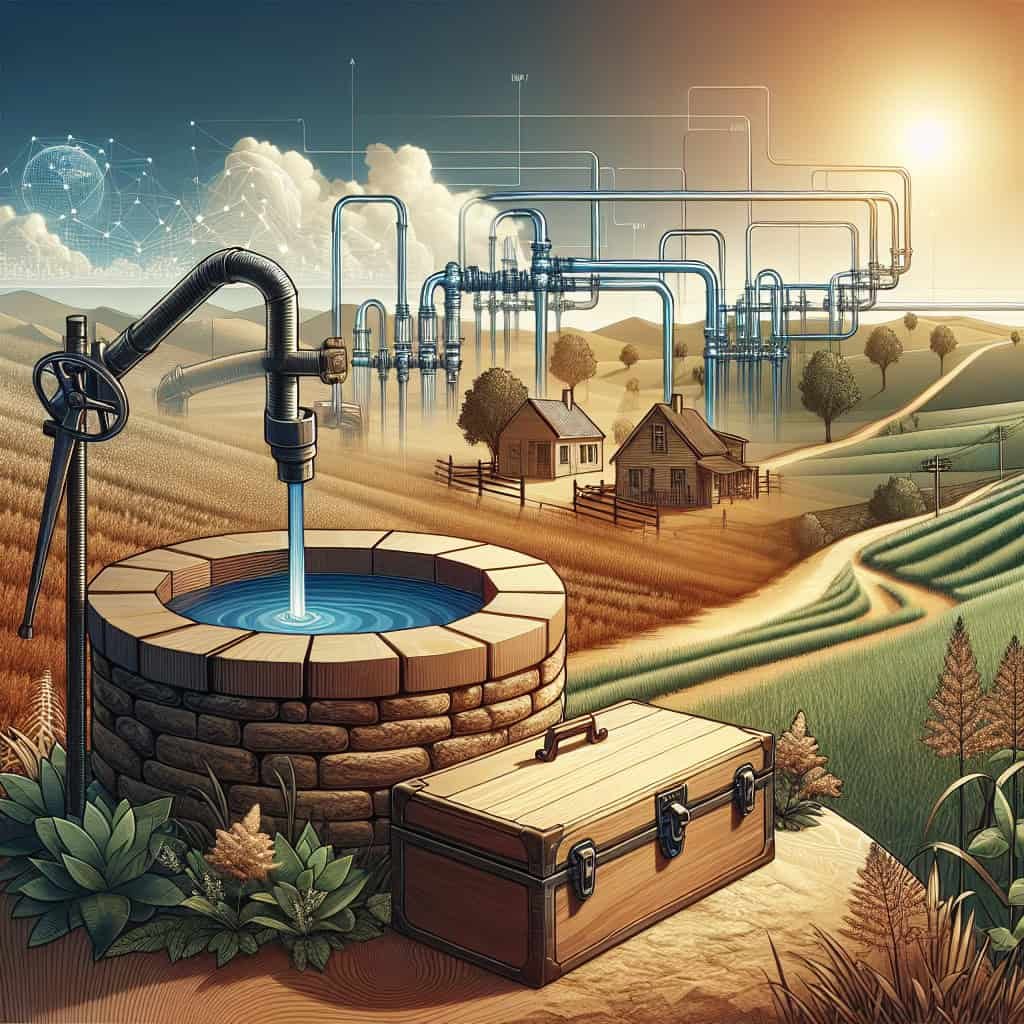If you’re a well owner living in an area with well water system upgrade options, you may be wondering how to access the resources available to you. The good news is that there are numerous resources out there specifically designed to assist well owners in upgrading their water systems. Whether you’re looking for financial assistance, technical support, or information on the best practices for maintaining your well, this article will guide you through the process of accessing these valuable resources. So, let’s get started and make sure you have access to all the tools you need to improve your well water system.
Finding Information about Well Water System Upgrades
Contacting Local Government Offices
When considering well water system upgrades, one of the first steps you can take is to reach out to your local government offices. They can provide you with valuable information about the regulations, permits, and codes that may be applicable to your area. Local government offices often have departments or divisions dedicated to water resources or environmental health that can guide you in the right direction. By contacting these offices, you can gain a better understanding of the requirements for upgrading your well water system.
Consulting with Well Water System Contractors
Another valuable resource for finding information about well water system upgrades is consulting with well water system contractors. These professionals specialize in the installation and maintenance of well water systems, making them highly knowledgeable in the field. They can provide you with expert advice on the types of upgrades available, the benefits and considerations, and the overall process involved. By consulting with well water system contractors, you can gather valuable insights to help you make informed decisions about upgrading your system.
Exploring Online Resources
In today’s digital age, the internet is a treasure trove of information, and it can be a great place to find resources about well water system upgrades. Online resources such as government websites, blogs, and forums can provide you with a wealth of information. Government websites often have dedicated sections that provide guidelines, regulations, and assistance programs related to well water systems. Blogs and forums can offer insights and experiences from other well owners who have already undergone system upgrades. By exploring these online resources, you can broaden your knowledge about well water system upgrades and find answers to your specific questions.
Understanding Potential Water System Upgrades
Types of Well Water System Upgrades
There are several types of well water system upgrades that you can consider depending on your specific needs and circumstances. Some common types of upgrades include installing a water treatment system, upgrading the well pump, replacing the storage tank, or improving the distribution system. Each type of upgrade serves a different purpose, whether it’s to enhance water quality, increase water pressure, or optimize system efficiency. Understanding the various types of upgrades available will help you determine which ones are relevant to your well water system.
Benefits and Considerations of Upgrading
Upgrading your well water system can offer numerous benefits. Improved water quality, increased water pressure, and reduced maintenance issues are just a few advantages that come with a well-planned and executed upgrade. However, it’s important to consider certain factors before making any decisions. These considerations may include the cost of the upgrade, the availability of funding or assistance programs, the potential disruption to your daily water usage during the upgrade process, and any regulatory requirements or permits that need to be obtained. By weighing the benefits and considerations, you can make an informed decision about whether or not to proceed with an upgrade.
Determining the Need for an Upgrade
Determining the need for a well water system upgrade involves assessing the current performance of your system and identifying any existing issues or limitations. This can be done by monitoring factors such as water pressure, water quality, and system efficiency. If you are experiencing recurring problems or if your system is outdated and not meeting your needs, it may be an indication that an upgrade is necessary. Additionally, changes in your household’s water usage or regulations in your area can also prompt the need for an upgrade. By evaluating the performance of your well water system, you can determine whether or not an upgrade is warranted.

Evaluating Available Funding and Assistance Programs
Local and State Government Programs
One of the avenues to explore when considering a well water system upgrade is the availability of funding and assistance programs offered by local and state government agencies. These programs are typically designed to support well owners in improving their water systems while addressing specific community needs. They may offer financial assistance, tax incentives, or low-interest loans to help offset the cost of the upgrade. Contacting your local or state government offices, as mentioned before, can provide you with valuable information about these programs and how to apply for them.
Federal Funding and Grants
In addition to local and state programs, there are federal funding and grant opportunities that can provide financial support for well water system upgrades. These programs are often administered through agencies such as the Environmental Protection Agency (EPA) or the United States Department of Agriculture (USDA). They may offer grants or loans specifically targeted towards well water system improvements. Exploring federal funding options can expand your possibilities for obtaining financial assistance when upgrading your system. Be sure to check the eligibility criteria and application process for each program to determine if you qualify.
Non-Profit Organizations Offering Assistance
Non-profit organizations dedicated to water resources and conservation may also offer assistance programs for well owners. These organizations often strive to promote the sustainable use of water resources and may provide educational resources, technical support, or financial assistance. Some non-profit organizations also collaborate with local or state government agencies to deliver comprehensive programs for well owners. Researching and reaching out to these organizations can provide you with valuable resources and guidance throughout the upgrade process.
Getting a Professional Assessment
Hiring a Well Water System Inspector
Before proceeding with any well water system upgrade, it is essential to get a professional assessment of your current system. Hiring a well water system inspector can provide you with a comprehensive evaluation of your well, pump, storage tank, and distribution system. The inspector will assess the condition, performance, and potential issues of your system. They may conduct well yield tests, inspect the pump and electrical components, and check for any signs of contamination or damage. A professional inspection will help identify the specific areas that need improvement and assist you in making informed decisions about the necessary upgrades.
Conducting Water Testing
Water testing is an integral part of assessing the need for a well water system upgrade. It involves analyzing the quality of your water to identify any contaminants or impurities that may be present. Testing can be done by collecting water samples and sending them to a certified laboratory for analysis. The results will provide you with crucial information about the overall water quality and any specific issues that need to be addressed. Conducting water testing as part of the assessment process will ensure that you consider the quality of your water when planning for system upgrades.
Assessing Water System Performance
In addition to a professional inspection and water testing, it is important to evaluate the performance of your water system as a whole. This includes considering factors such as water pressure, flow rate, and system efficiency. Are you experiencing low water pressure or frequent fluctuations? Is your system struggling to meet your household’s daily water demands? Evaluating the performance of your water system will help you identify areas that are not functioning optimally. This information will guide you in determining the appropriate upgrades needed to address these performance issues.

Choosing the Right Water System Upgrade Option
Analyzing Water System Requirements
After gathering information through assessments and inspections, it is crucial to analyze your water system requirements. This involves considering the specific needs and challenges of your household. Are you primarily concerned with improving water quality, increasing water pressure, or optimizing system efficiency? Each upgrade option addresses different requirements, and analyzing these needs will help you identify which option is most suitable for your situation. If necessary, consulting with experts in well water systems can provide invaluable guidance to ensure you choose the right upgrade option.
Considering Budget and Financing Options
Budget considerations play a significant role in the decision-making process for well water system upgrades. It is important to assess your financial resources and determine how much you can allocate to the upgrade project. The cost of upgrades can vary depending on the type of upgrade, system size, and any additional requirements or permits. Exploring financing options, such as loans or grants, can help bridge the gap between your available budget and the total cost of the upgrade. Additionally, some contractors may offer financing plans or payment options to make the upgrade more affordable. By considering your budget and exploring financing options, you can make a well-informed decision that aligns with your financial situation.
Consulting with Well Water System Experts
When it comes to choosing the right water system upgrade option, consulting with well water system experts can be invaluable. These experts have extensive knowledge and experience in the field and can provide guidance tailored to your specific needs. They can help you understand the benefits and considerations of each upgrade option and assist in determining the most suitable solution for your well water system. By consulting with experts, you can make informed decisions that take into account both the technical aspects and your unique circumstances.
Understanding the Process of Well Water System Upgrades
Obtaining Necessary Permits and Approvals
Before beginning any well water system upgrades, it is crucial to obtain the necessary permits and approvals. The requirements for permits may vary depending on your location and the type of upgrade you plan to undertake. These permits ensure that your upgrade project complies with local regulations and environmental standards. Contact your local government offices or relevant regulatory agencies to determine the specific permits required. It is important to complete the permit application process and receive approval before initiating any construction or modification activities.
Hiring Licensed Contractors
Well water system upgrades often require specialized knowledge and skills, making it essential to hire licensed well water system contractors. These professionals have the expertise to install, repair, and maintain well water systems in compliance with industry standards. When selecting a contractor, consider their experience, qualifications, and reputation. Request references and review their previous work to ensure their expertise matches your upgrade needs. Working with licensed contractors will not only ensure the quality and safety of the upgrade but also provide access to warranties and after-sales support.
Monitoring and Maintaining the Upgraded System
Well water system upgrades are not a one-time fix but rather an ongoing commitment to maintain water quality and system performance. After completing the upgrade, it is important to establish a regular monitoring and maintenance routine. This includes periodic testing of water quality, inspecting the well, tank, and pump, and addressing any maintenance or repair needs promptly. Following the manufacturer’s recommendations and consulting with well water system experts will help ensure the longevity and efficiency of your upgraded system. By investing time and effort in monitoring and maintenance, you can enjoy the benefits of a well-functioning water system for years to come.

Ensuring Water Quality and Safety
Implementing Regular Water Testing
Maintaining water quality is crucial for the health and safety of your household. Implementing regular water testing is essential to identify any potential contaminants or impurities that may be present in your well water. Depending on your location and specific concerns, testing can include parameters such as bacteria, nitrates, pH levels, and heavy metals. By regularly testing your water, you can identify any issues promptly and take the necessary steps to address them. Water testing can be conducted through certified laboratories or with the help of professional water testing services.
Maintaining Water Treatment Systems
Water treatment systems, such as filters, disinfection systems, or softeners, can play a significant role in ensuring water quality and safety. If you have a water treatment system as part of your well water system upgrade, it is crucial to maintain these systems regularly. This includes replacing filters, monitoring disinfection levels, and cleaning or sterilizing system components as required. Following the manufacturer’s recommendations and consulting with water treatment professionals will help you optimize the performance and longevity of these systems.
Addressing Potential Contamination Sources
Addressing potential contamination sources is an important aspect of ensuring water quality and safety. Contamination can occur from various sources, including nearby septic systems, agricultural activities, or industrial sites. Regularly inspecting your property for any potential contamination sources and taking appropriate measures to mitigate their impact is essential. This may involve ensuring proper separation distances, implementing best management practices, or conducting inspections by relevant environmental agencies. By addressing potential contamination sources, you can minimize the risk of water contamination and protect the health of your household.
Educating Yourself about Well Water Health and Safety
Understanding Well Water Basics
Educating yourself about the basics of well water is essential for maintaining its health and safety. Knowing how wells function, the importance of groundwater protection, and the factors that can affect water quality will help you make informed decisions regarding your well water system. Resources such as government publications, educational websites, and local extension offices can provide valuable information about well water basics. By understanding the fundamental principles, you can better appreciate the significance of well water system upgrades and the measures necessary to maintain a safe water supply.
Identifying Common Water Quality Issues
Being aware of common water quality issues is crucial for identifying potential problems in your well water. Issues such as bacterial contamination, high mineral content, or chemical contaminants can adversely affect the quality of your water. Understanding the signs and symptoms of common water quality issues, such as foul odors, unusual tastes, or discoloration, will help you recognize when an upgrade or intervention may be necessary. Local health departments, water testing laboratories, and online resources can provide valuable information about common water quality issues in your area.
Promoting Water Conservation
Promoting water conservation practices is not only beneficial for the environment but also for the sustainability of your well water system. Conserving water reduces strain on the aquifer and helps maintain water levels in your well. Simple measures such as fixing leaks, using water-efficient appliances, and practicing responsible outdoor water use can significantly contribute to water conservation efforts. Acquiring knowledge about water conservation practices and implementing them in your daily routine will ensure the long-term viability of your well water system and support the overall well-being of the community.

Connecting with Local Well Owner Associations
Joining Well Owner Associations
Connecting with local well owner associations can provide you with a network of support and knowledge exchange. These associations often consist of well owners who share common interests and face similar challenges. By joining a well owner association, you can access resources, attend educational events, and participate in community initiatives related to well water systems. The opportunity to connect with experienced well owners and industry professionals can be invaluable when considering system upgrades or addressing any concerns. Local extension offices or online directories can help you find well owner associations in your area.
Attending Workshops and Events
Well water system workshops and events offer opportunities to learn from industry experts, gain practical knowledge, and connect with other well owners. These events are often organized by local government agencies, non-profit organizations, or extension offices. Workshops may cover topics such as well maintenance, water quality testing, or understanding regulations. Events provide an avenue to ask questions, share experiences, and stay updated on the latest trends and solutions in well water systems. Attending these workshops and events will help you stay informed and well-equipped to make informed decisions regarding your well water system.
Networking with Other Well Owners
Networking with other well owners can be incredibly valuable for sharing experiences, troubleshooting issues, and learning from each other’s knowledge. Local well owner associations or online forums dedicated to well water systems are great platforms for connecting with other well owners. By engaging in conversations and discussions, you can gain insights into common challenges, potential solutions, or recommendations for contractors and service providers. Networking provides a sense of community and support, making your well water system journey more rewarding and less daunting.
Exploring Alternative Water Sources
Investigating Rainwater Harvesting Systems
Interested in exploring alternative water sources? Rainwater harvesting systems can be an excellent option to supplement your well water supply and conserve groundwater. These systems capture and store rainwater from rooftops, which can be used for various purposes such as irrigation, toilet flushing, or laundry. Rainwater can often be treated to meet certain standards for drinking water usage as well. Investigating rainwater harvesting systems can help diversify your water supply, reduce reliance on your well, and contribute to overall water conservation efforts in your community. Local government offices or environmental organizations can provide guidance on regulations and best practices for rainwater harvesting.
Considering Greywater Recycling Options
Greywater recycling is another alternative water source to consider when exploring well water system upgrades. Greywater refers to wastewater generated from sources such as sinks, showers, or washing machines. This water, after appropriate treatment, can be reused for purposes such as landscape irrigation or toilet flushing. Greywater recycling systems can significantly reduce the demand on your well by utilizing and treating water that would otherwise go down the drain. It is important to familiarize yourself with local regulations, system requirements, and treatment options when considering greywater recycling. Consulting with experts in the field can provide valuable guidance on the best approach for your specific situation.
Exploring Community Water Systems
If you are facing severe water quality issues or if your well water supply is insufficient, exploring community water systems may be a viable option. Community water systems are centralized water sources that serve multiple households or communities. These systems can provide a reliable and regulated water supply, often sourced from treated surface water or deep wells. Joining a community water system can ensure access to safe and quality water without the responsibility of maintaining your individual well. Contacting local water providers or researching community water systems in your area will help you determine if this option is suitable for your needs.
In conclusion, finding information about well water system upgrades involves reaching out to local government offices, consulting with well water system contractors, and exploring online resources. Understanding the potential upgrades available, the benefits and considerations, and determining the need for an upgrade are essential steps in the process. Evaluating available funding and assistance programs can provide financial support for the upgrade project. Getting a professional assessment through a well water system inspector, conducting water testing, and assessing water system performance are crucial for making informed decisions. Choosing the right water system upgrade option involves analyzing water system requirements, considering budget and financing options, and consulting with well water system experts. Understanding the process of well water system upgrades, obtaining necessary permits and approvals, hiring licensed contractors, and monitoring and maintaining the upgraded system ensures successful implementation. Ensuring water quality and safety includes implementing regular water testing, maintaining water treatment systems, and addressing potential contamination sources. Educating yourself about well water health and safety involves understanding well water basics, identifying common water quality issues, and promoting water conservation. Connecting with local well owner associations, attending workshops and events, and networking with other well owners can provide support and knowledge exchange. Exploring alternative water sources such as rainwater harvesting systems, greywater recycling options, and community water systems can offer additional solutions for water supply and conservation. By following these steps and considering the outlined factors, you can make well-informed decisions when upgrading your well water system to ensure a sustainable and safe water supply for your household.


